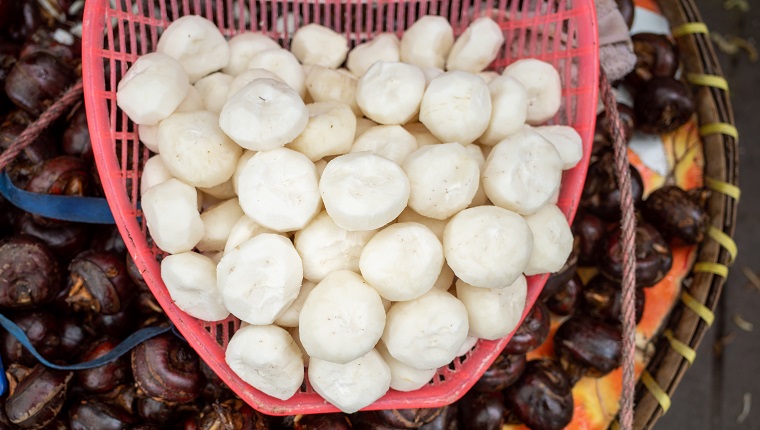Can dogs eat water chestnuts? Water chestnuts are often used in salads and a variety of side dishes. Some folks even wrap them in bacon! But are water chestnuts safe for our dogs to eat?
The short answer is yes, water chestnuts are safe for dogs with proper preparation. Pups would probably be pretty interested in a water chestnut wrapped in bacon, as a very occasional treat. But, of course, the best way for dogs to eat these is raw or simply cooked.
Before adding any new foods to your dog’s diet, though, you must consult your veterinarian. In the meantime, here’s everything you should know about how water chestnuts can be a healthy snack for your pup.
How Are Water Chestnuts Good For Dogs?
Water chestnuts are wonderful for humans due to their rich vitamin B6 content. This is, of course, of great nutritional value to dogs, as well. Vitamin B6 aids greatly in the prevention of vision loss and eye-related diseases. Also, it provides healthy energy!
As a snack, water chestnuts are a great option for dogs. They’re very low in fat, which gives them an edge over your standard dog treats, for sure. Plus, they also contain copper, which aids in bone health, blood circulation, and nerve repair.
Its third big benefit is right in the name of it — water!
Water chestnuts get their name because of their water content. Not only are dogs getting a snack, but they’re also getting a bit of hydration. It’s certainly not enough to make a huge difference, but it’s still a nice added benefit to their overall health score.
Moderation, though, must still be employed, due to a few slightly negative attributes.
How Can I Safely Give Water Chestnuts To My Dog?

Moderation is important when serving your dog water chestnuts because of their starch content. Too much can be very difficult for dogs to digest. To avoid unneeded digestion issues, you’ll want to keep water chestnuts as just an occasional snack.
Also, you’ll want to be mindful of the outer skin of the chestnut. This can be very difficult for dogs to digest, as well, and should be removed before serving. It’s also a choking hazard. Of course, so are the water chestnuts, themselves. Cutting them into bite-sized pieces is advised.
As for preparation, after removing the skin, water chestnuts can be served raw or cooked; either is safe. You just want to avoid serving your dog canned water chestnuts. These tend to have a much higher sodium content and typically are loaded with extra preservatives.
Finally, just because water chestnuts are okay, doesn’t mean that everything they’re often cooked with is. Letting dogs eat a Thanksgiving side dish of green beans and water chestnuts, for example, can be a bad idea. Often these dishes are prepared with onions and garlic, and both are toxic for dogs.
Does your dog enjoy snacking on water chestnuts? Do they prefer them raw or cooked? Let us know in the comments below.





